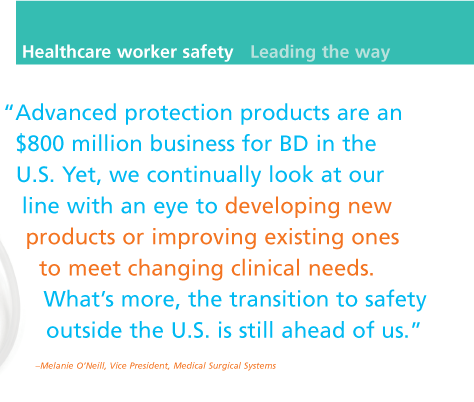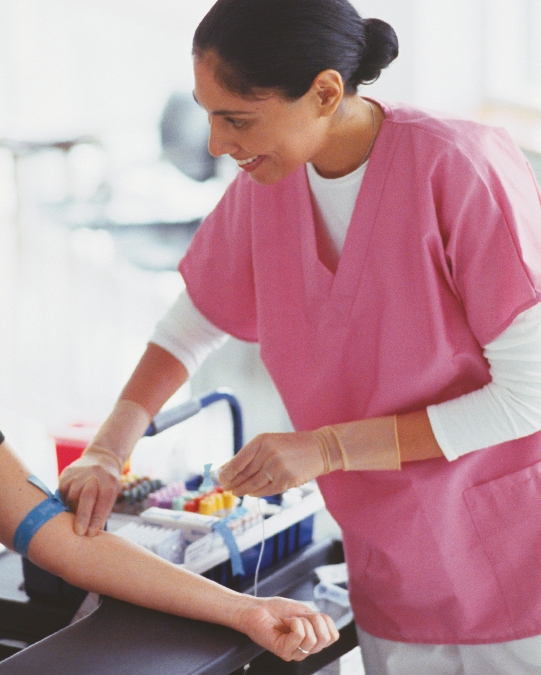
|

The BD Vacutainer Push
Button Blood Collection Set is
BD's next-generation safety
product in winged collection sets.
|
 |
 offers the most complete line of advanced protection
products in the industry, with more than 300 individual
catalog numbers. BD's leadership role in the effort to
protect healthcare workers from accidental sharps injuries is
showing highly positive results. According to the EPINet™
computerized surveillance program, which tracks needlestick
injuries to nurses in the U.S., the injury rate fell 51 percent
overall between 1993 and 2001 (the most recent year for
which figures are available). In fact, in eight of nine device
categories tracked by EPINet, needlestick injuries to nurses
fell at rates ranging from 55 to 100 percent. offers the most complete line of advanced protection
products in the industry, with more than 300 individual
catalog numbers. BD's leadership role in the effort to
protect healthcare workers from accidental sharps injuries is
showing highly positive results. According to the EPINet™
computerized surveillance program, which tracks needlestick
injuries to nurses in the U.S., the injury rate fell 51 percent
overall between 1993 and 2001 (the most recent year for
which figures are available). In fact, in eight of nine device
categories tracked by EPINet, needlestick injuries to nurses
fell at rates ranging from 55 to 100 percent.
BD is advancing safety in blood collection with its
BD Vacutainer Push Button Blood Collection Set. It joins
a wide range of safety-engineered blood collection devices,
including the BD Vacutainer Eclipse Blood Collection Needle,
which is widely used in the U.S. and is also winning acceptance
in Canada, Europe and Japan.
BD is also focusing attention on the operating room
with the launch of the BD Bard-Parker Protected Blade
System. This product offering complements the
BD Bard-Parker Protected Disposable Scalpel, introduced
in 2001 as a safer alternative to conventional disposable
scalpels. The BD Bard-Parker Protected Blade System
incorporates that same form and function in a reusable stainless-
steel surgical handle. A clear plastic sliding shield that
locks with an audible click and tactile feedback differentiates
the BD product. When retracted for use, the shield becomes
an integral part of the handle. When the blade is covered, the
audible click and tactile feedback recur. The shield is easily
activated with one finger; however, the clinician must also
press down to release the shield. This combination of the two
motions ensures that the shield is not moved accidentally.
The BD Bard-Parker Protected Blade System was launched
with the most popular size handle and blade sizes. BD is
adding to the line with a goal of offering blades and handles
in all configurations and sizes.
For ophthalmic surgery, BD expanded its line of safety-engineered
products this year with the introduction of the
BD Safety Knife with BD Xstar Blade. The single-use knife
features an integrated safety shield to protect the BD Xstar
Blade, which is manufactured using a proprietary grindless
technology for sharpness and consistency. The integrated safety
shield is activated by the user through a spring-assisted slider
that provides tactile and audible feedback in the shielded and
unshielded positions.
The BD Integra Syringe with retracting
BD PrecisionGlide needle is the first product
of its type with a detachable needle, enabling
clinicians to use different needles for aspiration
and for administration of medication.
 |

The BD Bard-Parker Protected Blade System
represents one of the most sweeping
changes in surgical blades in the 90 years
since surgical handles with replaceable
blades were developed.
|
The BD Hypak prefilled
syringe with BD Preventis
automatic needle shielding
system is the most
widely used safety
system for prefilled
syringes in the U.S.
 |
Winged collection sets
are an important device
in blood collection, especially
for the elderly,
children and those with
fragile veins. To meet the
needs of these patients
while also helping to protect
healthcare workers
from needlestick injuries,
BD offers widely-used
devices including the
BD Vacutainer Safety-Lok
Blood Collection Set.
Seeking even more
advanced protection
for healthcare workers,
BD has introduced the
BD Vacutainer Push
Button Blood Collection
Set, designed with the
specific goal of preventing
needlestick injuries
during blood sample
collection. Developed
with extensive input
from clinicians, this is
the first semi-automatic
winged needle set with
next-generation features
including intuitive, onehanded
in-vein activation.
The easier the device
is to use, the more likely
healthcare workers
are to use it properly,
thereby complying with
safety guidelines and
reducing injuries. |
|
 |
|
|
|



